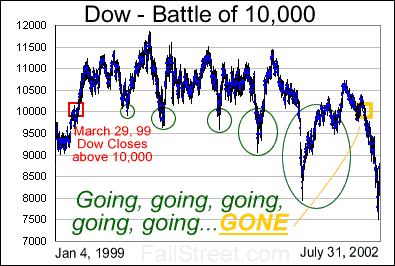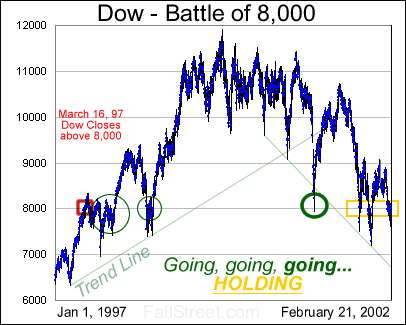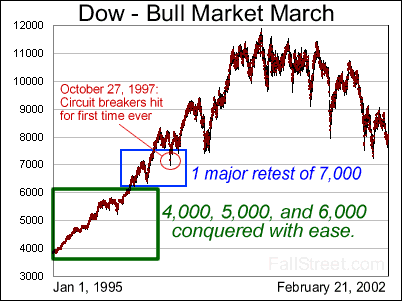February 24, 2003
The shorts know that a weak economy is a weak economy
The Inflation/Deflation Debate
Following last weeks surge in producer prices – a surge that was not mirrored by January’s CPI (consumer prices tend to lag producer prices) – the inflation/deflation combatants took aim. Neither side was willing to give an inch.
Roach: “the case for deflation actually looks more compelling than ever.”
Comstock: “we are still convinced that the deflationary scenario will prevail”
Bugos: “deflation fears are irrational.”
In this historic battle of prophesy whose forecast will prove most accurate? Well, not only do I not know for sure, but I am beginning not to care.
Inflation is bad. No. Wait. Good
Wall Street wouldn’t know what to do with capital without an interest rate forecast/model in hand, and many average investors cling to related mantras to justify their market outlook:
Bull Ammo: Inflation is under control.
Bear Ammo: The Fed will be unsuccessful in fighting deflation.
In short, investor fascination with interest rates is fascinating in itself. After all, during the last three years inflation has been under control, yet stock prices have still tumbled. Am I missing something? If the markets crash when inflation is timid and roar ahead* at the first sign of higher rates does this not erase every interest rate model economist’s held dearly just three years ago?
* There is the growing ‘feeling’ (from numerous sources) among analysts that stocks will cheer escalating interest rates because it will be a signal that deflation is under control and/or that the economy is rebounding.
Weighing in on the debate
The Fed is almost out of ammo (already out of ammo when you compare the Fed funds to inflation), record government deficits are ahead, and the dollar is on the ropes. Quite frankly, I get headache thinking about the possible inflation/deflation outcomes because of these three events. Not only can a myriad of interest rate (inflation) speculations be fashioned from these occurrences, but the unknowns are really unknowns. For example, the current account deficit has been out of whack for more than a decade. How can anyone – many try - assume that the current account deficit is now the gospel for forecasting the value of tomorrow’s dollar?
In sum, there can be little doubt that people like Roach offer the investor a macro perspective that is interesting and informative. However, when it comes to buying specific companies macro speculations should not carry more weight than micro realities. Quite frankly, economic weakness is economic weakness: it doesn’t matter whether or not prices are rising or falling.
As for which camp (the inflation or deflation camp) provides a more accurate prophesy about the path of prices in the coming years; the deflationary argument still looks more likely given that overcapacity is what plagues the U.S. economy. However, 90 years ago the Federal Reserve Board was created for the purpose of counterfeiting money and/or keeping prices stable. A bet for deflation is a bet against the Fed. And while an addicted gambler may feel it necessary to bet against the Fed, the rational person realizes this is a bet with poor odds, and an even less appealing pot. Quite frankly, very few investors win if the Fed loses…
Historic Dow Battles
It took 8 different intraday battles for the Dow to finally close above 10,000, and it took countless battles before the Dow relinquished this mark. Who knows, maybe 5-20 years from now the 10K battle will be resumed?
 |
Until the 10K battle resumes the investor should be aware of reachable/current battle zones. Quite frankly, psychological battle areas, while fundamentally meaningless, can be important during tumultuous times. For example, when the Dow crashed below its trend line following 9/11 a psychologically important support level stopped its fall (8,000).
 |
After 8,000, the next level worth pointing out (other than October’s lows) is Dow 7,000. Some small skirmishes have taken place at Dow 7,000 and it may not worthy of the term ‘battle area’. Nevertheless, the last restest of 7,000 (red circle) was similar to the post 9/11 retest of 8,000 in that it arrived during a crisis like sell off.
 |
While there is no fundamental reason for the Dow to stop sliding at October’s lows or at 7,000, what investor’s believe is worth considering is sometimes worth considering. If and when Dow 7,000 arrives, if enough investors do not consider this level worthy of a ‘blood on the street’ gamble, there is no ‘next level’ of support. Rather, Dow 6,000 came and went in a blink of an eye, and the Dow made its way through 5,000 with little pause.
This Week
CBS MarketWatch’s Nutting never ceases to amaze. Last Friday he had this to say:
“Markets are beginning to disregard any news that's not war-related.”
Yes, the word ‘beginning’ is about a month late. However, Nutting’s next statement is even more baffling:
“Economic news, in particular, fails to impress investors the way it used to.”
This wouldn’t have anything to do with the fact that the economic news has awful, would it?
Suffice it to say, this week promises to be more of the same: every time the markets rise/fall the Nutting’s will point to Iraq. I don’t buy it. What I do buy is that short sellers could be ready to jump back into this market in a big way at the first hint of weakening prices. To be sure, last weeks NYSE short interest report was the biggest shock thus far this year: short interest barely budged as stocks plunged (short interest from Jan 15-Feb 14). What this means is that either shorts are terrified (possibly bemused by the SEC’s push for new regulations) or they are waiting…
For 3-years we have all heard fables of ‘sidelined’ money returning to stocks. During this time short sellers have quietly taken directional control of the markets. In fact, if it were not for the record short covering spree in October the last rally in the markets would have not lasted as long as it did (Incidentally, Wall Street had a good story going to sucker in a few investors in Oct/Nov/December 2002 and this embellished the short covering rally. That story – that the Stimulus Brothers are going to make all the right moves next year – is ‘beginning’ to fall apart.) Given that the U.S. economy is weak -- that short sellers like to attack micro weakness not macro inflation/deflation speculations -- it is difficult to believe that short sellers are not willing to send prices sharply lower in the currently illiquid and uninteresting market. Quite frankly, earnings for 1Q03 are going to be terrible (compared to 1Q02), and a cold snap/producton worries have already sent oil prices to dangerously high levels. Knowing this; the shorts could pile in and have an impact on prices.
The biggest story this week and in the weeks to come may not necessarily be Iraq, but the potential response by short sellers to Iraqi developments. Quite frankly, the current stats suggest that the shorts are more likely to reenter rather than exit the markets en masse. And while there is no guarantee that the shorts will keep control of the market -- they could remain ‘sidelined’ for years -- investors should be on high alert over the threat of reaching previous ‘battle zones’.
February consumer confidence reports are due out this week, along with Chicago PMI. The rest of the reports are will be for January and 4Q02.
|
|
|
All data and information within these pages is thought to be taken from reliable sources but there is no guarantee as such. All opinions expressed on this site are opinions and should not be regarded as investment advice.
Copyright © 2000-2003. FallStreet.com